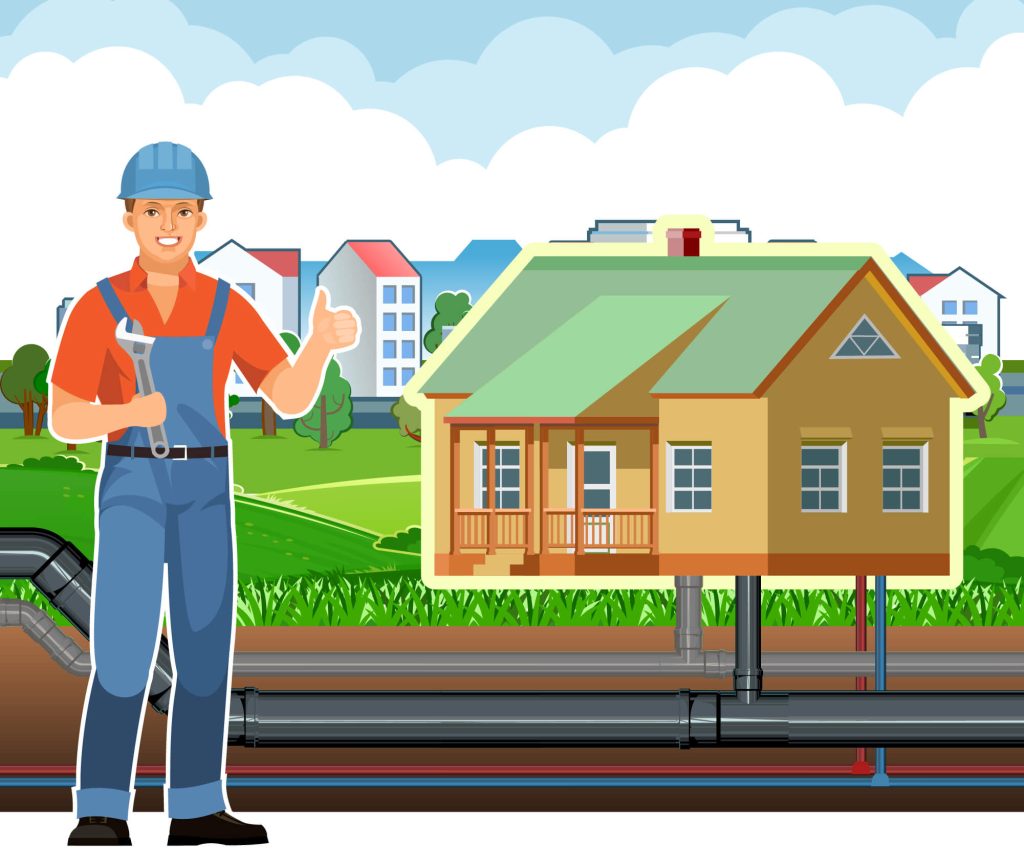Factors like curb appeal, interior aesthetics, and neighborhood amenities often take center stage in homeownership. However, there’s an often-overlooked aspect that plays a pivotal role in determining a home’s overall value: the health of its sewer lines. The labyrinth of pipes hidden beneath our homes may not be visible, but their condition can significantly impact not only the functionality of a residence but also its market worth. With this article, we aim to help you understand the intricate connection between sewer line health and the broader spectrum of home value.
The Unseen Infrastructure
Before diving into the connection, it’s crucial to understand the role of sewer lines in a home’s infrastructure. Sewer lines are the silent workhorses responsible for carrying away wastewater from our homes to the municipal sewage system. These pipes transport it all, whether it’s water from showers, toilets, or kitchen sinks. As a critical component of a home’s plumbing system, any issues with the sewer lines can lead to a cascade of problems that extend beyond the pipes.
Functional Impact
The health of sewer lines directly affects the functionality of a home. Clogs, leaks, or blockages in the sewer system can result in slow drainage, foul odors, and even sewage backups within the property. Such issues not only disrupt daily life, but can also cause extensive damage to the home’s foundation, flooring, and walls. The financial burden of repairing these damages can quickly escalate, impacting the overall cost of homeownership.
Financial Implications
Homebuyers, real estate agents, and appraisers are becoming increasingly aware of the importance of a home’s hidden infrastructure. A sewer system in good condition can be a significant selling point, positively influencing a home’s market value. On the flip side, a neglected or damaged sewer line can be a red flag for potential buyers, leading to decreased property values. Savvy homebuyers understand that a thorough inspection of a property’s sewer system is as critical as checking for a solid roof or updated electrical systems.
Preventive Maintenance
As with any other aspect of homeownership, preventive maintenance is key for sewer lines. Regular inspections and timely repairs can ensure the system’s smooth operation and protect the home’s overall value. Homeowners should be proactive in scheduling routine inspections and addressing any identified issues promptly. In the long run, investing in preventive maintenance can save both money and headaches.
The Role of Technology
Advancements in technology have transformed the way we approach sewer line health. Modern inspection tools such as sewer cameras allow professionals to conduct thorough assessments without invasive digging. This technology enables homeowners and potential buyers to have a clear picture of the condition of the sewer lines, making informed decisions about maintenance or property purchase.
Insurance Considerations
Homeowner insurance providers are increasingly considering the condition of sewer lines when determining coverage and premiums. A home with a well-maintained sewer system may be deemed less risky, potentially leading to lower insurance costs. On the contrary, a history of sewer-related claims or neglect could result in higher premiums.
Environmental Impact
A damaged sewer line poses not only financial risks but also environmental concerns. Leaks or cracks in the system can contaminate soil and water sources, leading to potential health hazards and legal ramifications. Environmentally conscious homebuyers may factor in the ecological impact of a compromised sewer system when evaluating a property.
Maximizing Home Value through Proactive Measures
Regular Inspections
Homeowners should schedule routine inspections, especially before putting a property on the market. A professional inspection using advanced tools can identify potential issues early on, allowing for timely repairs and preventing larger, more costly problems down the line.
Documentation for Buyers
Sellers can enhance the appeal of their property by providing comprehensive documentation regarding the sewer system’s maintenance history, recent inspections, and any repairs or upgrades. This transparency instills confidence in potential buyers, showcasing the commitment to the property’s long-term health.
Investing in Upgrades
Consider upgrading to modern sewer line materials, such as PVC or HDPE, which are more durable and resistant to corrosion than traditional materials like clay or cast iron. While this may involve an initial investment, it can be a strategic move to enhance the property’s overall value.
The Role of Local Regulations
Compliance with Codes
Local building codes and regulations may mandate specific standards for sewer systems. Ensuring compliance with these codes is a legal obligation and can prevent potential issues during property transactions. Non-compliance can lead to costly fines and delays in selling a home.
Impact on Property Appraisal
Appraisers take into account the overall condition of a property, including its infrastructure. A well-maintained sewer system can positively influence the appraised value, potentially justifying a higher listing price. Appraisers may consider the cost of potential sewer repairs when assessing a property’s worth.
Contact Your Local Plumbing Professionals
In the complex tapestry of homeownership, the thread of sewer line health weaves into multiple facets, influencing everything from day-to-day functionality to long-term financial considerations. Recognizing the importance of this hidden infrastructure and taking proactive measures can safeguard a home’s value and contribute to a more sustainable and resilient real estate investment. As homeowners and industry professionals elevate their awareness of the connection between sewer line health and overall home value, we can expect a positive shift toward more informed and responsible property management.
If you are experiencing backups in your main sewer line or any other plumbing issues, Aloha Plumbing, Sewer, & Drains is here to help!

